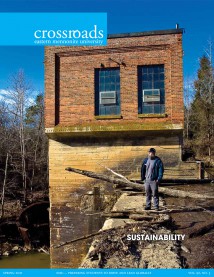For decades, environmental sustainability across the world has been a focus of EMU alumni working in international development, usually working with Mennonite Central Committee (MCC). In recent years, many people linked to EMU – alumni, staff and faculty – have answered MCC’s call to reverse the degradation of God’s creation, encompassing land, sky and seas. Those MCC workers living amid the relative prosperity of North America are trying to reduce unnecessary consumption, to live as “lightly” on the earth as possible, and to work with others to grow and distribute food responsibly. Those serving in other countries are often involved in easing the burden of environmental degradation on the poor, who are disproportionately concentrated in the Global South.
Here are six examples of EMU-linked people, supported in part by MCC, who are addressing environmental problems:
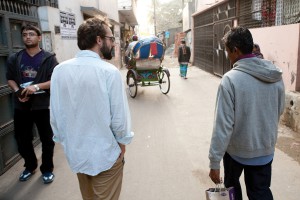
Based in Bogra, Bangladesh, Nathan Charles, class of ’02 (second from left), directs Mennonite Central Committee’s Appropriate Technology Program. “The whole point of this is to find sustainable paths to better lifestyles,” he says.
1. In Bogra, Bangladesh, Nathan Charles (class of ’02) directs MCC’s Appropriate Technology Program. Upon his arrival in 2008, Charles designed and helped build a “sustainable technology research center” to demonstrate and test various projects of the appropriate technology program. One example is harvesting “black” and “gray” water from household drains and toilets to reuse for irrigation, after bioremediation in an artificial wetland. The center also features a prototype solar paper dryer at the technology center, for use in an ongoing MCC effort to promote handmade paper as a way of generating income in Bangladesh. The solar dryer would provide a cheaper, healthier alternative to the wood-powered dryers currently in use.
Another appropriate technology project Charles has worked on, in partnership with George Fox University in Oregon, is to improve the design of the vangari – a flat-bed, pedal-powered rickshaw used for hauling stuff rather than people – for easier, more efficient use. Through his work there, Charles hopes to see some lasting impact on sustainable living in the world’s most densely populated country, where 164 million people live in a space the size of Illinois.
2. A solar electricity installation in Kathmandu, Nepal, where Micah Shristi ’00 (formerly Keller) serves as MCC program administrator, was a simple matter of practicality. With the country’s hydroelectric stations operating at reduced capacity during the dry season from October to May, chronic power shortages cause regular blackouts.
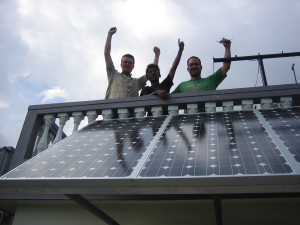
Micah Shristi ’00 (left) helped design, manage and install solar panels at the MCC office in Kathmandu, Nepal. Shristi is the country’s MCC program administrator.
“At the peak of the dry season there is no electricity for 16 hours per day,” Shristi writes. “MCC needed electricity to run its office, so we hired a local company to install 800 watts of PV [solar panels] on the roof of the office building.”
Shristi, who earned a master’s degree from Appalachian State University in 2008 with a concentration on appropriate technology, helped design, manage and install the 800-watt photovoltaic system.
On a previous MCC assignment in Nepal, Shristi worked on a project to encourage farmers in southeastern Nepal to grow roselle, an ingredient in Red Zinger and other herbal teas. A solar dehydrator he built to dry the roselle worked beautifully, save for another seasonal challenge: roselle harvest in the region coincides with a foggy, misty and generally sun-less time of year. With a lesson learned, both Shristi and the roselle farmers have moved on to other projects.
3. Since 2005, Nathan Harder ’05 has worked with MCC in the rural, agriculture-based community of Moro Moro, Bolivia. During the past year, Harder has been part of a group called the Consorcio Ecologico (Ecological Consortium) that works in environmental education and promotes alternative, sustainable farming methods. Much of the group’s work, he says, has been conducted through half-day workshops used to teach farmers about efficient composting of animal manure, the use of mineral sprays, and how to make various fertilizers from readily available ingredients.
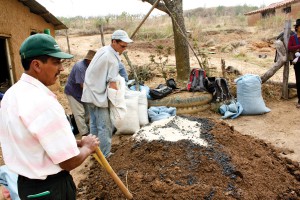
As an MCC volunteer in rural Bolivia, Nathan Harder ’05 works on a variety of sustainable agriculture projects. Harder (above, center) is mixing a batch of compost.
Harder has also applied himself to preventing soil erosion on sloped farmland, to constructing large concrete tanks to store irrigation water and extend farm productivity longer into the dry season, and to studying how compost benefits the production of potatoes – Moro Moro’s major cash crop.
“I enjoy being outdoors in the sun and wind, hearing birdsong all day, being able to work with people, soil and plants. It makes me feel alive,” says Harder, who is thinking of becoming a small-scale farmer himself, as Jamie Miller-Gonzalez ’01 decided to become after his MCC farming stint in Nicaragua.
4. Joél Kempf ’00 does similar work for MCC as a sustainable agriculture consultant in Mozambique. Kempf is currently working with the Christian Council of Mozambique on “sand dam” projects in Manica and Tete provinces, where limited rainfall and poor infrastructure leave many hungry and dependent on outside food aid. Sand dams trap rainfall, which often comes in intense bursts, in large beds of sand that accumulate behind walls built across seasonal rivers. By seeping into the sand, the stored water – used for drinking and irrigation – is naturally filtered and suffers minimal evaporative loss.
A particularly successful sand dam in the town of Dzunga, Kemps says, provided nearly 100 farmers with enough water to grow new cash crops like cabbage, lettuce, carrots, bananas, mangos and others, providing them with more income to feed their families. The sand dams also mean women in Dzunga don’t need to walk long distances to get water during the dry season. Finally, the dams provide a reliable water source for livestock, a valuable source of income for local families during times of scarcity.
The Christian Council of Mozambique has also begun a project to teach farmers in Mozambique sustainable production techniques for new, drought-resistant cash crops like manioc and sweet potatoes.
Jenny Bishop Kempf ’00, Joél’s wife, has worked in Mozambique with the United Church of Christ on a project that helps people, most of them women, to make small business loans among themselves and otherwise manage their finances.
5. Elsewhere in Africa, Nathan Horst ’01 [not pictured] is working with Help Channel Burundi (HCB) as part of his MCC assignment in that country. He has been involved in a reforestation project funded by the Canadian Food Grains Bank – several million trees have been planted to replace the forests cut down during decades of civil war. To assist in that process, Horst developed an iPhone app called EthnoCorder, which is used to collect field data and analyze the effectiveness of HCB’s programs. (EthnoCorder was developed in collaboration with a San Francisco software company co-founded by his brother, Andrew Horst ’99.)
Since beginning to use the iPhone app to interview beneficiaries of HCB’s reforestation project, Horst says the organization has refocused its program to concentrate on small-scale agroforestry as a way to improve food security.
His wife, Lara Ressler Horst ’01, advises HCB on child rights issues. She also does cultural research on the history of textiles in and around Burundi.
For more information on Help Channel Burundi’s work, view www.youtube.com/user/helpchannelburundi
6. From his current base at EMU where he is chair of the biology and chemistry department, Doug Graber Neufeld continues to maintain the links he developed as a MCC-supported scholar in 2005-07 working with two universities in Cambodia – the Royal University of Phnom Penh and the Royal University of Agriculture.
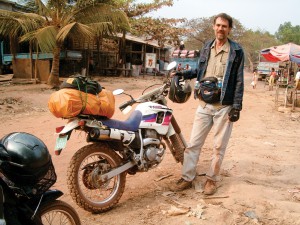
EMU biology professor Doug Graber Neufeld, PhD, spent 2005-07 in Cambodia developing environmental curriculum for two universities and testing water quality. He has returned during two summers, focusing on water sanitation projects with student research assistance – LAURA CATTELL ’09 and ALLISON GLICK ’10 went one time; Gene Fifer ’10, Chrissy Kreider ’11 and Jakob zumFelde ’11 went the next.
Graber Neufeld combined research into environmental toxins with capacity-building in environmental education for Cambodians. This work continued after 2007 with two summertime trips by five EMU science students to Cambodia, supported by a National Science Foundation grant.
The work of Graber Neufeld and his university collaborators has focused on five major topics: (1) pesticide contamination of market vegetables; (2) air pollution in Phnom Penh; (3) the relationship between natural wetlands and sewer discharges from Phnom Penh; (4) arsenic in drinking water; and (5) water quality from pump wells in a rural Cambodian province.
Graber Neufeld’s colleagues in Cambodia continue to ship clay samples to EMU, where an atomic absorption spectrophotometer can assess the levels of arsenic in the clay. Such testing is important for Cambodians’ health because the clay is used in making low-cost ceramic water filters destined for Cambodia’s rural areas.
Graber Neufeld earned his PhD in biological sciences from the University of Texas at Austin. He specializes in environmental toxicology.
– AKJ & BPL
